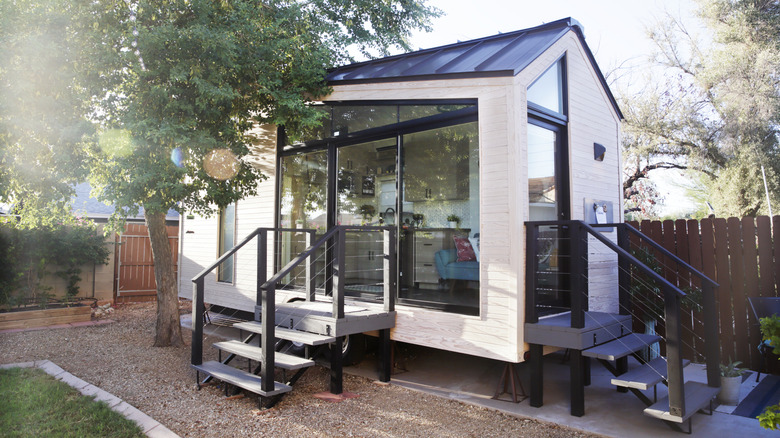Don't Fall For A Tiny House Scam On Amazon. Red Flags To Look For
Caveat emptor, or buyer beware, is a warning we humans have needed for ages. To tack onto this wise Latin expression, if something sounds too good to be true, it probably is. With the surprising amount of money an average home costs in many U.S. cities now, the lure of paying a sliver of the average price of a similarly sized home for your own house is understandable. However, don't be fooled by this pig's lovely lipstick.
There are several questionable prefab tiny homes available on Amazon, some at mind-blowing prices, and many of them are worthy of your suspicions. You can even find testimonial videos from jilted consumers on YouTube who explain how they were taken in by these cut-rate offers. Consumers on these scam homes share stories of cancelled orders without refunds, nonexistent customer service, and the product never arriving. Other frustrated buyers complain of getting the runaround while ordering, like being asked to cancel their Amazon order and reorder for a higher price through another venue. Most alarmingly, Amazon reviewers report never receiving the home.
How to avoid and fight tiny home scams
We've seen countless tiny homes that are incredibly charming, but what's the point if you'll never see it? Beyond buyer beware, it certainly helps to be aware of red flags that your amazing purchase is not going to deliver on its promises — literally. First and foremost, let money issues raise your eyebrows. Shockingly low prices, rent-to-own options, and iffy payment details like not accepting PayPal or moving to different payment platform all can be hallmarks of a fraud. Requesting contact through an alternate messaging service like WhatsApp should also raise suspicion.
Another major concern is the company's website — or lack thereof. Can you find what you'd like to buy on the company's external website? Saiyijixie, the business behind one model reported as spam, has a suspiciously limited online presence beyond Amazon. In fact, clicking to its Amazon storefront routes you to products under different brands. There may also be cases where the company does have a website, but it's not legitimate. You can usually identify a fraudulent website if it doesn't explain who they are as a business. No matter the website, it's wise to spend a bit more time researching the company to sway any doubts.
If you've been duped into parting with a huge chunk of cash on a, let's face it, fake house, there is something you can do. The Federal Trade Commission reassures consumers that with nearly any kind of payment method, there's a way to recoup your investment. Whether you paid with a cash app, credit or debit card, wire transfer, or with cryptocurrency, contact the intermediary (like your bank or credit card company) to have them flag the purchase as fraudulent.

